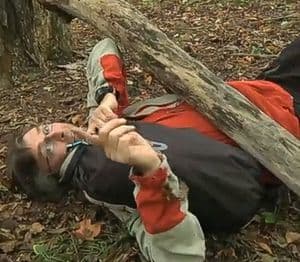Bear Bagging
Keeping your food safe from bears (and other critters) is an important element of any camping trip. Not only do you want to reduce the chance of having an unwanted close encounter with bear, raccoon or field mouse - but you also don't want to loose your food. Your food is an important part of your trip.
There's a number of ways to store your food. The most notable, however, is hanging it.

First, load all food, and anything else with strong odors (i.e. toothpaste, sun screen, hand lotion, soap, Skin-So-Soft bug repellent) in a separate pack, barrel pack or waterproof bag. Then, string it up over an outstretched limb or between two trees. Which ever you choose, make sure to set up the bear rope early in the evening so you just have to go and pull the food pack up before bed. There's nothing worse than looking for a proper tree to hang your food in when it's pitch dark. Also, make sure to choose a tree well away from camp, at least 30 meters (90 feet) into the forest, and not on a well-used trail. A bear, especially in well-used parks, will quickly get to know each campsite's food cache if it's easy to locate.
It helps to tie a piece of florescent flagging tape onto the bear rope. It's not all that easy to re-locate your bear rope hanging in the back bush when it comes to rigging the food bag up later in the evening and the flagging tape helps more then you can imagine.
Pulley System
For the first few days of a trip the food bag may be a little too heavy to lift. Try bringing two sections of rope, one with a small medal pulley (found at any hardware store) tied to one end. Throw the pulley rope over the branch, with the other rope being passed through the pulley. Then tie the other end of the pulley rope to a tree and hoisting up the heavy pack with the other rope. The pulley also adds as a good weight on the end of the rope while tossing the rope over a single limb or over the rope tied between two trees.
Bear Barrels
Some canoeists have opted to use barrels for keeping their food safe. They're a great system to keep everything dry and relatively odor-free and they can come in handy when traveling in the far north where there are no tall trees to hang your food from. But in no way should they be considered "bear barrels." In the last few years there has been numerous reports about campers who have placed their food barrel right beside their tent and been woken up to a bear smashing it to pieces. Algonquin Park has even reported that in the last two years bears have got to know that a blue barrel means food, the same as Yogi identified to a picnic basket, and have ripped open a number of barrels to get the contents. Remember, if a bear can break into an automobile with one swing of the paw, then a thin plastic barrel is no match for it.
Food Floating Technique
Another alternative for canoeists and food storage is to load up your boat and then anchor it out in the lake for the night. Personally, I'd be far too paranoid about a storm blowing the canoe away to attempt this. If a storm blows in, however, you could be in for a surprise come morning. Bears have also become used to this technique in some parks and will swim out to fetch the food stored in the canoe.
Kevin Callan is the author of 11 books including "Wilderness Pleasures" and "The Happy Camper." A regular keynote speaker at major North American canoeing and camping expos for over 20 years, he has received three National Magazine Awards and four film awards, including top award at the prestigious Waterwalker Film Festival. Callan lives in Peterborough, Ontario, birthplace of the modern-day canoe.
Related Articles
Learn how to choose the right lure or bait color based on the season. The key, according to Chad Hoover,…
A red-tailed hawk was rescued by two kayak fishermen, Matt Wells and Dana Scroggins, after it was…
This page will be updated with the best Kayak Fishing videos. We hope you like 'em!
Mention guns and canoe trips in the same breath and some folks are apt to go ballistic. Still, if you're…



